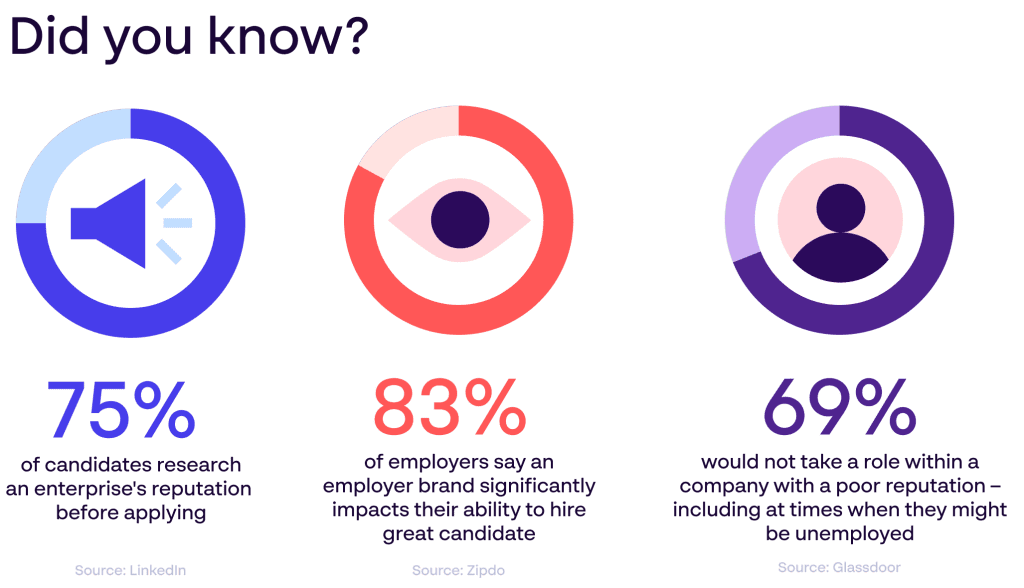Your global employer brand is the core of how you attract, recruit and retain top talent worldwide. It is the message, value and vision that tell your target audience why they would want to work for you over your competitors.
For the top global companies, developing an effective employer brand strategy is essential in connecting with potential recruits and your existing team members on a global scale.

With so much choice of workplaces available to today’s skilled employees, having a global employer brand that truly connects and resonates with your preferred target audience is how the best global brands reap the most talented recruits.
Take Vodafone for example -nan organisation we’ve been proud to work with for several years now to deliver greater, more consistent employer branding. One of the most recognised brands around, they have devoted a lot of time and effort in crafting their global employer brand identity to appeal to their ideal employee persona.
From transparency over their vision as a company to creating aspirational employer branding materials, Vodafone recognises the advantages clear strategy gives them in how they acquire talent. And this also takes into account how they interact with their local markets.
A global employer brand is not one-size-fits-all
Unquestionably one of the greatest challenges facing top global businesses is communicating and disseminating their central brand and identity to their employees and prospective recruits worldwide. Crossing boundaries means new cultures, new languages and new customs.
Employees are individuals, and never is that more apparent when you move from country to country. Brands that take a “one-size-fits-all” approach to their global employer brand strategy risk alienating individuals whose needs, motivations and cultures differ from the messages they are putting out there.
Nowadays, job seekers need to be treated like consumers, and the cost of an employer brand that doesn’t consider their distinct customs and traditions will:
- Restrict your ability to attract the highest-quality candidates
- Result in higher costs in attracting top talent, as well as employee retention, over time
- Lead to drops in employee engagement across your teams
While the essence of your brand values shouldn’t change from location to location, as this will undoubtedly cause confusion as to what your global employer brand stands for, it needs to have been framed in a way that engages your local audiences.
For instance, say part of your company’s core values is an approach that’s incredibly team-oriented and encourages collaboration. That might be more significant to your market in one country than in another. Instead, you should adapt your messages to champion a different core value that is more relevant to that specific audience – that’s part of a good employer branding strategy.
Your global employer branding team should be given time to develop a clear understanding of the local markets that you operate in, performing whatever external surveying work and analysis necessary to understand what they want out of a workplace culture and how your brand can accommodate this.
How to translate your global employer brand to your local markets
As mentioned, thorough research into the individual markets you operate in is essential to discover the cultural considerations affecting the area. This will take time, but it’s vital in identifying elements that your target audiences consider crucial in the work environment of an employer of choice.
Think of the employee experience
Remember, your global employer brand strategy towards your local markets should begin and end with the employee experience. Most employees will look to have their own individual needs met, and an appreciation of a market’s culture and society gives you a greater chance of meeting their requirements.
Take time to break down the persona of your ideal team member:
- What goals/motivations do they have?
- What are their key demographics?
- What personality traits do they demonstrate?
- What challenges do they face?
- What would they want out of your workplace experience?
Once you’ve determined a top-line understanding of this through interviews with staff members and qualitative research, go to the extra level in referencing the various cultural nuances and features that distinguish one location from another. That way, you will be able to attract talent in a much more effective way.
Encourage employees to be brand advocates
Next, the best global brands will utilise their existing employee base as brand ambassadors to connect with local audiences in an organic, natural way. Content shared by employees typically receives 8 times the engagement of content on a brand’s official channels, largely because it feels more personal and credible.
Global businesses with the best employer branding – encouraging and rewarding a company-wide culture of employee advocacy – stand to receive the greatest benefits when appealing to other team members and prospective recruits across their local markets. As your employees promote and interact with others in a meaningful way, others will gain a stronger appreciation for your identity and values.
Whether this is achieved by an incentive programme or by adjusting your marketing strategies to incorporate more “team-focused” content, inspiring your current employees to spread your brand’s message can be a powerful way of attracting candidates.
Harness technology to stay consistent and constant
Brand consistency and frequency are also key to translating your global employer brand to your local markets. While you will likely need to make alterations in terms of language and imagery used, the essence of your brand identity should never waver. Honesty and transparency are important in developing a genuine connection with your target markets.
Therefore, the ability to create and share marketing materials that consistently communicate your brand’s personality to each of your local markets is crucial. Having access to a sophisticated brand management solution makes a real difference in maintaining the core elements of your brand’s identity across all locations, with the function to tailor the imagery, language and layout as necessary to a specific audience (something our systems at Papirfly are capable of providing).
This branding software will also ensure that your local teams can frequently craft and create collateral from the ‘single source of truth’ found in your brand guidelines. This is vital in maintaining regular engagement with your audiences – not just to those you are interested in recruiting, but in reinforcing the shared familiarity with your brand among your existing employees. If these communications are not actively maintained, you risk missing out on attracting top talent and reducing your employee retention.
Essentially, when it comes to protecting and maximising your global employer brand, it is a case of think globally, act locally. By taking the time to address cultural nuances in each of your markets and adapting your marketing to appeal to these, as well as harness the power of your existing employees to reach these groups, you place your organisation in a much better position to attract, recruit and retain talent against other top global companies.
Top global brands reaching their local audiences
So, how are some of the best global brands appealing to their local markets? Here are some examples that might inspire your approach:
Vodafone
As highlighted earlier, Vodafone in recent years has placed a deeper emphasis on pushing their global employer brand as a means of attracting top talent. After conducting extensive research, they identified eight ‘proof points’ that give people worldwide a fundamental picture of what it’s like to work at Vodafone. From there, this core message is adapted to each market to effectively translate the message, with the company utilising our own brand management solution to create and disseminate this material.
Unilever
Utilising a hero campaign on being ‘more than just your job title’ on a worldwide and local scale, Unilever’s global employer branding team work closely with their local outlets to tailor their messages most effectively and inspire their current staff members to push their identity out on their own personal channels.
L’Oreal
L’Oreal’s innovative approach to a transparent, consistent and candidate-driven recruitment strategy allows them to compete with the top global companies in securing talent. They present universal employee value proposition pillars to their markets worldwide with an appreciation of the cultural disparities.
Dell
Dell has committed to recruiting to recruiting an employer branding team, with leads in each of their regional markets, giving them a clear indication of the cultural nuances, trends and events that will inform how their materials will work in those areas. By receiving this insight and experimenting and analysing their campaigns, they are constantly refining how to tap into their local audiences.
Verizon
Finally, Verizon’s employer brand marketing takes an unwavering approach to championing the achievements and happiness of team members in all local markets, to present everyone in their organisation is engaged with their brand. This magnification of their brand presence through organic, employee-driven content and diverse, current-event messages helps them stand out among the best global brands for prospective job seekers.
Adding a local edge to your global employer brand
We hope this article has helped you recognise the value of adapting your global employer brand around your local markets. While we live in a world that is globalising more and more each day, being able to adapt your message to appeal to the specific cultures, languages and traditions of each market will give your organisation added impetus in your mission to acquire talent and improve employee retention.
Your global employer brand is an investment in your company’s future, and it’s crucial you give it the capacity to fully engage your existing and prospective employees. With our brand management platform for employer branding teams, we empower your teams to go after their local markets frequently, consistently and successfully, with the option to tailor each message for each audience. All with no specialist expertise.
Start empowering your workforce and connecting with your audiences across the globe today.
